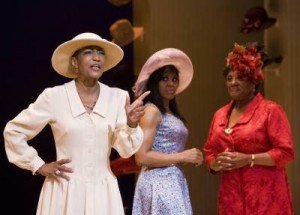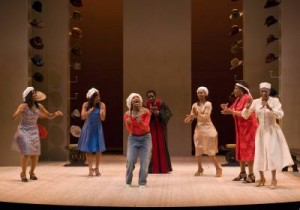RECOMMENDED
The all-around stupendous performances of its seven stars are the best reason to see Crowns at the Pasadena Playhouse. Six of the country’s most talented African American singer-actresses and one equally gifted singer-actor do powerful work in Regina Taylor’s musical adaptation of Michael Cunningham and Craig Marberry’s eponymous book about church women and their beloved hats.
Before meeting Crowns’ five multigenerational “Church Ladies,” though, we are introduced to Yolanda, a sassy, street-smart New York teen who’s been sent down south to her grandmother’s house, the better to recover from the shooting death of her brother Teddy. As Yolanda tells us her story in hip-hop verse, an African priest standing behind her performs what appears to be a native ritual, the juxtaposition of the two symbolizing the connection between traditional African and contemporary African-American culture—including the tradition that a woman wear some kind of head covering, whether scarf, headdress, or hat.
In an attempt to show Yolanda the beauty and importance of a cultural tradition which goes back to their African homeland, the other five women recount to her, and to us, the stories of their hats. “Our crowns have been bought and paid for,” says one of them. “All we have to do is wear them.” Another explains, “Hats are like people. Sometimes they reveal. Sometimes they conceal.” Yet another recalls, “Mama would always say, ‘Put something on your head.’” Another remembers watching her mother get dressed for church every Sunday, explaining that she liked all of her mother’s hats except the one made of fox—with the fox’s head intact, its tiny eyes wide open. We also hear about the blind mother who could recognize her hats by their feel. Though she didn’t have many hats, we are told, she wore one every Sunday.
For Yolanda, this “hat culture” seems like something out of a foreign land. Her own mother wore turbans, she explains, but that was only so as not to have to worry about what her hair looked like. Not surprisingly, it takes a while for Yolanda to appreciate the other women’s love for their “crowns.” It’s hard for the street-tough New Yorker to understand how one of them can say, “I’d lend my children before I’d lend my hats. My children would know their way home, but not my hats.”
Yolanda is taught the rules of hat culture. Never touch a woman’s hat, not after all the work she’s done to get it to tilt just so. Hats are to be admired from a distance. And forget about close hugs. There’s a right way and a wrong way to embrace a friend when both are wearing hats. A propos, one of the woman reveals that (just to be on the safe side), “whenever I hear a movement behind me, I duck.”
A preacher chimes in with his own opinions regarding hats. How can a woman who insists that tithing would be too great a financial burden still manage to buy a new hat every week? The reverend is none too happy either with women whose decision whether to attend church depends on whether they have the right hat in their closet.
The women’s hat stories are tied together by a couple dozen songs, most of them hymns, performed powerfully by the fabulous (mostly) female cast—Sharon Catherine Blanks (Velma), Vanessa Bell Calloway (Jeanette), Suzanne Douglas (Wanda), Paula Kelly (Mother Shaw), Angela Wildflower Polk (Yolanda), and Ann Weldon (Mabel), and Clinton Derricks-Carroll in all the men’s roles. The entire company joins in for rousing renditions of “When The Saints Go Marching In,” “We’re Marchin’ To Zion,” “Take Me To The Water,” Walk All Over God’s Heaven,” and others. The legendary Kelly shines in “I Got A Crown Up In That Kingdom,” “I’m On The Battlefield,” “None But The Righteous,” and “‘Tis The Old Ship Of Zion.’” Derricks-Carroll belts out “If I Could Touch The Hem Of His Garment” and “Mary Don’t You Weep.” It’s Blanks, though, who provides the evening’s most stirring moments singing “His Eye Is On The Sparrow” and “When I’ve Done What I Can,” her powerhouse voice rising way up to the rafters.
Still, despite the extraordinary work of the cast and the show’s sensational three-piece band, Crowns plays for the most part like a PBS talking heads documentary, and one’s interest in it will depend on how closely one is able to identify with the women’s lives and stories. I found my attention wandering, particularly during a long, seven-song Baptism sequence. The show could stand a ten to fifteen minute trim.
If I found Crowns not quite compelling, it was more a matter of my not being part of its “target audience” than through any fault of Israel Hicks’ lively direction. Choreographer Keith Young gets high marks for his assorted dances, ranging from hip hop to African tribal to “praise-and-worship” church steps—and one exquisite, almost balletic sequence featuring the divine Kelly, every bit as limber now as she was when she filmed Sweet Charity forty years ago!
Musical director Eric Scott Reed (on piano), Derf Reklaw (percussion) and Trevor Ware (Bass) provide thrilling accompaniment. Edward E. Haynes, Jr.’s set fills the stage with dozens of hats rising from floor level to the top edge of the proscenium. Dana Rebecca Woods’ costumes are exactly what these women would have chosen for themselves. Highest marks go as well to Lap Chi Chu’s lighting and Cricket S. Myers’ sound design.
I enjoyed much of Crowns, though I think it is likely to be more interesting and entertaining to audiences who feel a closer connection to the lives of the women it depicts.
Pasadena Playhouse, 39 South El Molino Ave., Pasadena.
www.pasadenaplayhouse.org
–Steven Stanley
July 23, 2009
Photos: Craig Schwartz




 Since 2007, Steven Stanley's StageSceneLA.com has spotlighted the best in Southern California theater via reviews, interviews, and its annual StageSceneLA Scenies.
Since 2007, Steven Stanley's StageSceneLA.com has spotlighted the best in Southern California theater via reviews, interviews, and its annual StageSceneLA Scenies.







 COPYRIGHT 2024 STEVEN STANLEY :: DESIGN BY
COPYRIGHT 2024 STEVEN STANLEY :: DESIGN BY